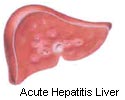Arthritis patients with rare
polymorphisms risk acute hepatitis with leflunomide
(Acute Drug Effects-March 22,
2004)
"Leflunomide, a new
immunomodulatory agent, was prescribed to a 67-year-old female patient with
rheumatoid arthritis. Fifteen days later she developed diarrhea and elevated
liver enzymes. A liver biopsy showed a pattern of acute hepatitis,"
scientists in Spain report.
acute hepatitis,"
scientists in Spain report.
"The patient was homozygous for the rare CYP2C9*3 allele, which determines
the slowest metabolic rate for CYP2C9 enzymatic activity that is probably
involved in the metabolism of leflunomide," explained C. Sevilla-Mantilla
and colleagues, Complutense University, Madrid, Gastroenterology Service.
"Liver damage subsided in a few weeks. This case illustrates the risk of
hepatotoxicity by leflunomide and suggests that it is possibly related to
CYP2C9 polymorphism," investigators advised.
Sevilla-Mantilla and colleagues published their study in Digestive and Liver
Disease (Leflunomide-induced acute hepatitis. Dig Liver Dis,
2004;36(1):82-84).
hepatitis. Dig Liver Dis,
2004;36(1):82-84).
For more information, contact J.M. Ladero, University Complutense Madrid,
Gastroenterology Service, Hospital Clinical San Carlos, Ciudad University,
E-28040 Madrid, Spain.
The information in this article comes under the major subject areas of
Immunotherapy, Gastroenterology, Hepatology, Rheumatology, and Pain
Medicine. This article was prepared by Gastroenterology Week editors from
staff and other reports.
ęCopyright 2004, Health &
Medicine Week via NewsRx.com & NewsRx.net